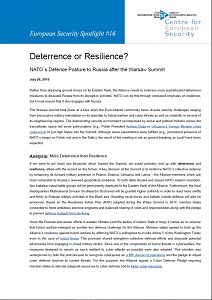Deterrence or Resilience? - NATO´s Defence Posture to Russia after the Warsaw Summit
Deterrence or Resilience? - NATO´s Defence Posture to Russia after the Warsaw Summit
Author(s): Luboš Fendrych
Subject(s): International relations/trade, Security and defense, Peace and Conflict Studies
Published by: Ústav mezinárodních vztahů
Keywords: deterrence; resilience; NATO; defence posture; Russia; Warsaw Summit;
Summary/Abstract: Rather than deploying ground forces on its Eastern flank, the Alliance needs to embrace more sophisticated deterrence measures to dissuade Russia from its disruptive activities. NATO can do this through increased emphasis on resilience, but it must ensure that it also engages with Russia. The Warsaw summit took place at a time when the Euro-Atlantic community faces diverse security challenges ranging from provocative military intimidation on its doorstep to hybrid warfare and cyber threats as well as instability in several of its neighbouring regions. The deteriorating security environment accompanied by social and political frictions across the transatlantic space led some policymakers (e.g., Polish President Andrzej Duda or Lithuania´s Foreign Minister Linas Linkevicius) to put high hopes into the Summit. Although some expectations were fulfilled (e.g., permanent presence of NATO´s troops on Polish soil and in the Baltic), the result of the meeting is not as ground-breaking as could have been expected.
Series: European Security Spotlight
- Page Count: 2
- Publication Year: 2016
- Language: English
- Content File-PDF

